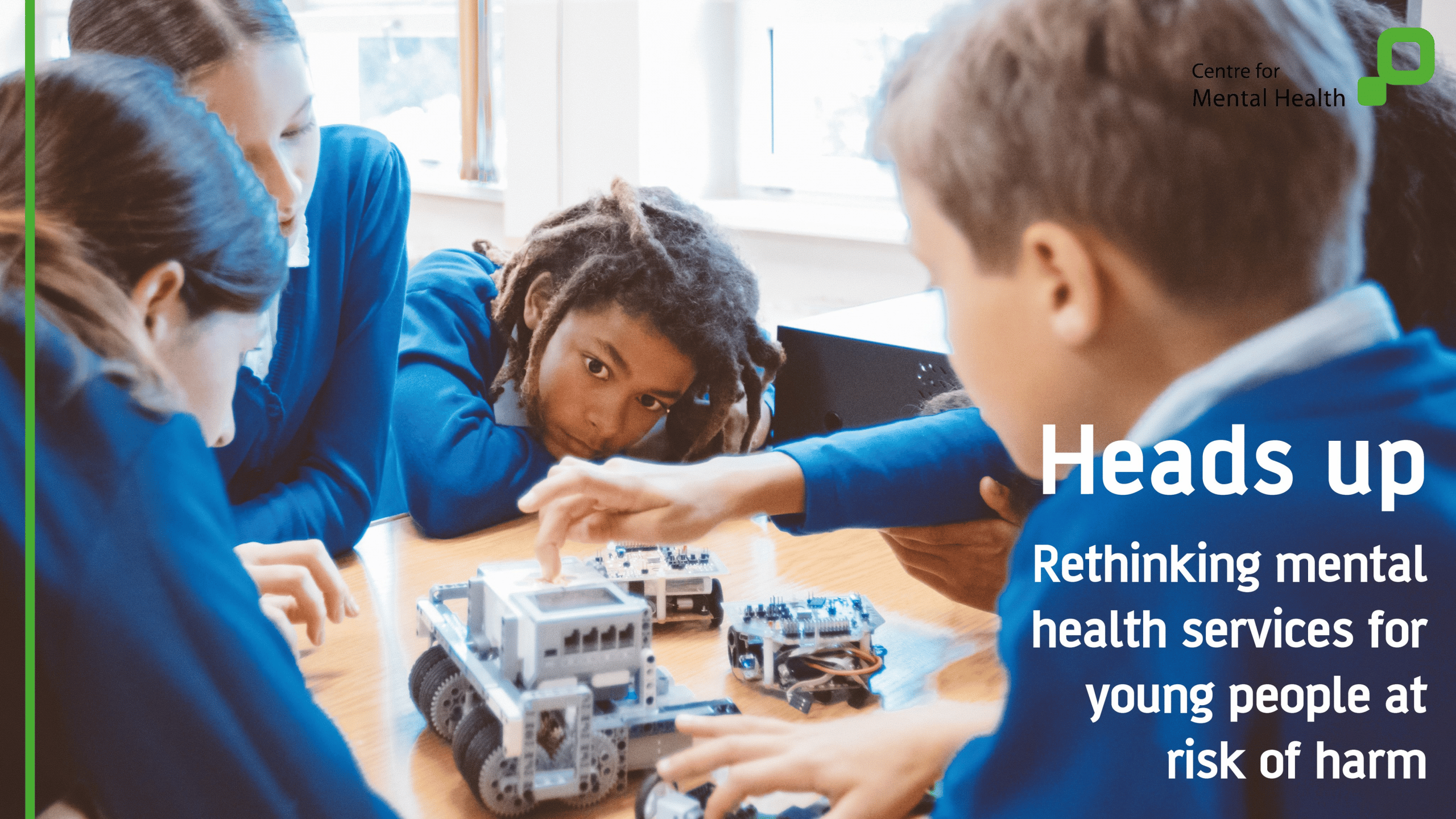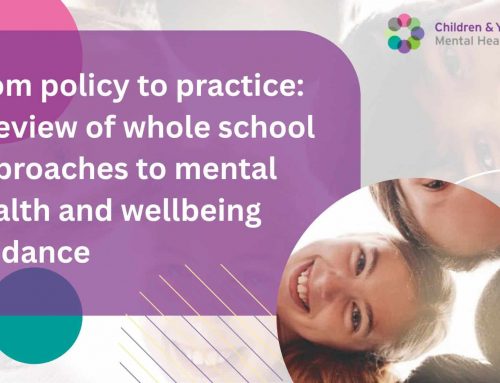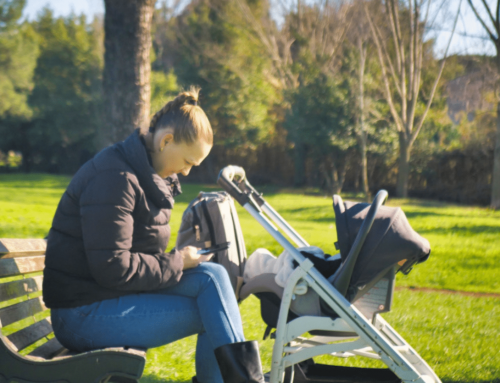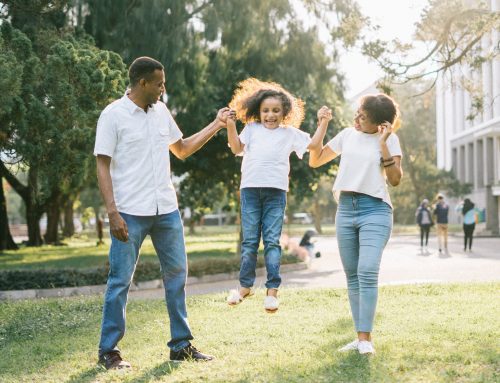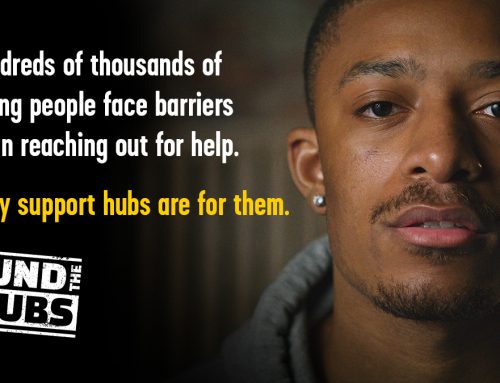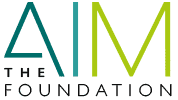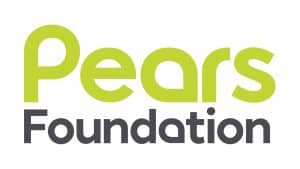Commission on Young Lives warns that children’s mental health services are buckling under pressure post-Covid
Alongside the Children & Young People’s Mental Health Coalition, Centre for Mental Health have co-authored this fourth report from the Commission on Young Lives on rethinking mental health services for vulnerable young people.
It reviews the latest data on mental health among children and young people with a focus on those who are at higher risk, including young people from racialised communities, lower socioeconomic backgrounds, young people with SEND, those who have been in contact with the criminal justice and care systems as well as LGBTQI+ communities. It brings together the views of young people and mental health practitioners, setting out the barriers to accessing mental health care and making clear recommendations for change.
Anne Longfield’s Commission on Young Lives warns post-Covid children’s mental health services are buckling under pressure and putting vulnerable young people at greater risk of exploitation, serious violence, and abuse.
- The Commission on Young Lives calls on the two candidates to become Prime Minister to pledge a once-in-a-generation post-Covid £1bn Recovery Package of support to make England’s children’s mental health services fit for purpose. The Commission proposes an NHS guarantee that ensures an improvement in the quality and effectiveness of treatment and ensures all children needing mental health treatment are seen within a 4-week period.
- The Commission on Young Lives report says children’s mental health system unable to cope with explosion of demand for help as schools, college leaders, charities, and parents warn that incidences of self-harm, attempted suicide, anxiety, and behavioural difficulties have become more extreme and frequent since lockdown. They tell the Commission on Young Lives how such problems have become an everyday occurrence in the lives of many young people.
- The report warns that despite some improvements in children’s mental health services, in 2020/2021, just 23% of children referred to services started treatment within the 4-week waiting target. The report says a rising tide of poor mental health has the potential to expose even more children to harm, exploitation, and offending.
- Vulnerable young people have told the Commission that they see the system of mental health support as outdated, over-medicalised and bureaucratic, often unresponsive, or unavailable.
- The report finds that young Black men are less likely to seek formal mental health support through doctors, counsellors, or psychologists and racialised communities are also more likely to report more dissatisfaction with mainstream mental health care.
Anne Longfield, Chair of the Commission on Young Lives, is today publishing the Commission’s fourth thematic report, ‘Heads Up: Rethinking mental health services for vulnerable young people’. The report looks at the growing crisis of mental health problems among children and young people in England and puts forward ambitious and innovative proposals to redesign young people’s mental health services, particularly for those young people at risk of harm.
The report, co-authored with the leading thinktank Centre for Mental Health, and the Children and Young People’s Mental Health Coalition, reveals a profound crisis in children and young people’s mental health services in England and a system of support that is buckling under pressure, frequently over-medicalised and bureaucratic, unresponsive, outdated, and siloed. Speaking with professionals who work with children, and to children and families themselves, the Commission has heard about young people who have barely returned to school since Covid, the increase in the regularity and extreme nature of many young people’s mental health problems, and how self-harm and suicide attempts are a much more regular feature of school and college life.
It warns that failing to support some young people with mental health problems could lead to more behavioural incidents at school, a rise in exclusions, and more children then becoming at risk of grooming and exploitation. The report says a rising tide of poor mental health has the potential to expose even more children to exploitation, crime, and offending. A failure to detect problems early in many young offenders reduces the likelihood that they will persist with criminal activity into adulthood.
The report does recognise how some children’s mental health services have widened the support they provide following increased investment. It also highlights the positive work being done by many organisations, charities, and community groups to provide support to children with mental health problems, including programmes that divert children with mental health problems away from crime. However, it argues that Children and Young People’s Mental Health Services is still losing the battle against rocketing demand for help and failing to meet the needs of thousands of children in crisis:
- It highlights how the Covid pandemic was a disaster for the mental health of many children. One in six children aged 6-16 were identified as having a probable mental health problem in July 2021, up from one in nine in 2017. There was a 47% increase in the number of new emergency referrals to crisis care teams in under-18-year-olds between December 2019 and April 2021.
- At the end of April 2022, 388,887 people were in contact with children and young people’s mental health services, and 352,866 new referrals were received. Yet in 2020/2021, just 23% of children referred to services started treatment within the 4-week waiting target.
- It highlights how there will be mental health teams in only a third of all schools, leaving two thirds of children in schools without this important resource. There are no immediate plans or funds to extend this number further.
The Commission has also been shocked to hear from those working with young people about how often those suffering from serious mental health conditions are unable to receive treatment in some areas until they have had multiple suicide attempts ‘with serious intent’. It has heard traumatic stories of teenagers who have attempted suicide but still not received an immediate referral for help, and from teaching staff in schools and colleges who are seeing a large increase in the number of their students attempting suicide.
The report shows how many young people and their families are not receiving the right kind of mental health support. It argues mental health services for young people are still not set up to support all those with multiple and complex needs, with clinical thresholds too rigid, some children ricocheting around services, and too many children only receiving help at crisis point. Early prevention services are underfunded and to not reaching most children, particularly the most vulnerable or marginalised. The report says:
- Many children from marginalised groups have negative perceptions of mental health services because they have had previously bad experiences of other statutory services. Clinical models devised to help young people often feel outdated, uncomfortable, and overly medicalised to children themselves.
- Young Black men are less likely to seek formal mental health support through doctors, counsellors, or psychologists and racialised communities are also more likely to report more dissatisfaction with mainstream mental health care. Many families, particularly those living in racialised communities, have a deep distrust of statutory services. Too many of the parents the Commission has spoken with were not receiving the non-judgemental care they wanted in a community environment they trust.
The report makes a number of recommendations, including:
- A commitment from the next Prime Minister to fund an immediate £1bn children and young people’s mental health wellbeing recovery programme to improve the quality and effectiveness of mental health care and support, with guaranteed appointment and treatment times as part of a wider post pandemic commitment to children and young people. Whilst this will be locally determined, it will fit within a national guarantee that all children and young people requiring CYPMHS treatment are seen within a 4-week period, with guaranteed next day emergency appointments for children at risk of serious self-harm and suicide
- Guaranteed mental health assessments for children and young people at points of vulnerability. This would mean an automatic assessment and guaranteed mental health package for children entering care and automatic assessments for children and young people at risk of exclusion from school, who go missing, at the point of arrest, or are involved in violence or crime. It would include a guarantee of assessment by education psychologists for any child at risk of exclusion.
- A national implementation programme to embed a whole school and college approach to mental health and wellbeing across all education settings in the country. This should include a commitment from Government to provide a funding package for Mental Health Support Teams beyond 2023/24 to ensure that all schools have access to this vital additional support by 2030.
- An ambitious programme of drop in mental health hubs delivered in the community.
- A national ‘Programmes on Prescription’ scheme in every area. The roll out of a major funded programme of social prescribing for mental health wellbeing that enables GPs and health professionals to pay for sports and arts sessions, music, drama, activities, youth clubs, outings, and volunteering programmes to improve young people’s confidence, self-esteem, and skills and make friends.
- A major recruitment programme with ambitious targets to build the children and young people workforce required to meet this expansion of services. It is vitally important to ensure that this workforce is diverse and culturally competent.
- Wellbeing and mental health training and support for all professionals working with children and young people.
- Improving the mental health and well-being of young people at risk of harm and being involved in the criminal justice system should be measured as a core aspect of NHS equality targets.
Anne Longfield, Chair of the Commission on Young Lives, said: “The children’s mental health emergency in England is so profound that we face a generational threat to our country’s future national prosperity and success. The scale of the problem is growing, rocket-boosted by the pandemic and the system is buckling under pressure and unable to cope with the explosion in demand for help.
“Thousands of vulnerable children are falling through gaps in the mental health support system, boosting the chances of those resourceful, manipulative, and ruthless criminals and abusers who are so good at grooming them.
“I am particularly worried that we will see an increase in school exclusions of children with mental health problems who are not receiving the support they need. Some of these children will be at greater risk of harm.
“The overall response from the Government to this children’s mental health crisis has so far been too slow and inadequate, and we are failing to support hundreds of thousands of children with mental health problems. It is shocking to hear that some young people who attempt suicide still do not receive an immediate referral for help and are discharged without any extra support.
“The next Prime Minister will have an opportunity to show they care about tackling this children’s mental health emergency. I would like both candidates in the Conservative leadership contest to commit to an immediate £1bn mental health wellbeing recovery fund for children and young people. This should include a guarantee that all requiring CYPMHS treatment are seen within a 4-week period, with guaranteed next day emergency appointments for children at risk of serious self-harm and suicide.
“Young people have told us what help they need. Unless we rethink and improve access to mental health support, we risk putting the post Covid generation of vulnerable children in even greater danger of exploitation, abuse, and poor life chances. A generation of young people is struggling and as a society we have a moral duty to respond.”
Centre for Mental Health chief executive Dr Sarah Hughes said: “Children and young people’s mental health is at risk from the after-effects of the pandemic, the cost of living crisis and the ongoing effects of endemic racism and inequality. We need action now to protect the mental health of those at greatest risk, including the poorest and the most marginalised children in society.
“Expanding mental health support for children and young people is essential. But alongside it we need to reduce child poverty, support young families, make schools mentally healthier and rebuild youth services.”
Steve Chalke, the founder and leader of Oasis, which hosts the Commission on Young Lives, said: “Children and young people’s mental health services just aren’t working for many of those who desperately need help. I regularly meet children and their families who are struggling with serious mental health problems but are on long waiting lists for treatment, can’t even get a referral or don’t trust that they will get the kind of help they need.
“Government needs to put in the right resources, and we need to have an urgent rethink about the kind of support we provide in communities and through schools.
“Until we tackle the drivers of youth crime, including underlying psychological and mental health issues, we will continue to fail children and young people at risk of being excluded, exploited and criminalised.”

